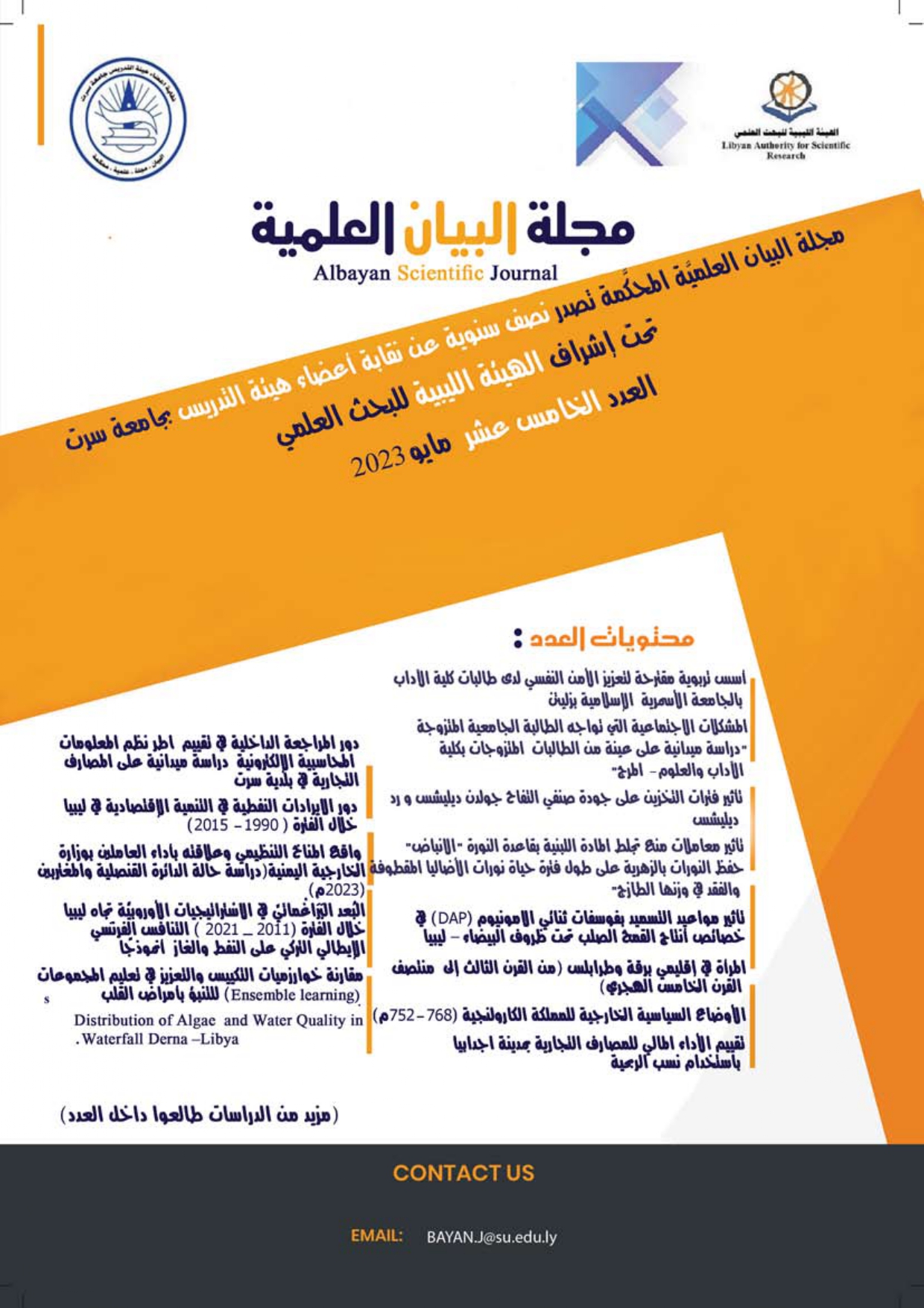The Responsibility of Incorrect Nutrition in the Expansion of Bowel Tumors: A Nutritional Survey Study
الكلمات المفتاحية:
Diet-Related Tumor، Bowel Tumor، Incorrect Dietary Routine، Living Way، Misurata، Tripoliالملخص
This effort regards as a part of diet-related tumor research. The present work offers a clue of the severity of bowel tumor incidence in Tripoli and Misurata, Libya over the past eleven years to spot the effect of incorrect dietary routines and living ways in expanding bowel tumors. 265 males and 203 females aged (25-85) years were diagnosed with bowel malignancy. Moreover, a nutritional survey study was performed on 100 Libyan patients (51 men and 49 women) from 1 January to 30 June, 2015. Participants were asked to report their dietary customs and living routine one year prior to getting hurt bowel tumors. The data proves that the incidence of bowel tumor is increasing over time from January 2004 to December 2014. Men are almost 13.2 % more likely than women to develop bowel tumor. There was a statistically significant association between males and females for getting bowel tumors (P= 0.039). The disease mostly happens in men >50 years old and in women >30 years old. A nutritional survey study finds that 24% of cases had a family history to develop cancer. Women had a family history to develop tumors than men. Results provide that more than half of patients are likely to drink 1 liter of water per day. Also, men tend to drink more water and consume red meat than women. All patients did not do exercise and had irregular sleeping time and all men were frequent smokers.
المراجع
References:
Agata L, Urszula R, Aleksandra C, Andrzej D, Beata K, Olga P, Monika P, Katarzyna S, Elzbieta C, Kamila K, Anna A, Dominika M, Michal W, Agnieszka B, Daniela M, Peter M, Piotr M. 2022. Nutritional Treatment of Patients with Colorectal Cancer. Int. J. Environ. Res. Public Health, 19(11): 6881.
Amal A, Mohamed E, Yousef E. 2015. Cancer magnitude in west Libya and study the effect of dietary habits in cancer incidence and cancer treatment using nanotechnology. Int J Res Sci, 1(2): 6 -10.
.Anna L, Grzegorz R, Tomasz L, Aleksandra S, Slawomir R. 2022. Risk factors for the diagnosis of colorectal cancer. Cancer Cont, doi: 10.1177/10732748211056692
ASCO. 2015. Cancer. Net: diet and nutrition. Available from http://www.cancer.net/navigating-cancer-care/prevention-and-healthy-living/diet-and-nutrition.
Better Health Chanel. 2021. Cancer and food. Deakin University, Australia. Available from http://www.betterhealth.vic.gov.au/.
Campbell M, Media D. 2015. Healthy eating: 5 main food groups. Available from http://healthyeating.sfgate.com/5-main-food-groups-3976.html.
Clare S, Willey B. 2022. Eating and bowel cancer. Available from http://www.cancerresearchuk.org .
Dyer, D. 2014. Can food reduce your risk of breast cancer?. Available from http://www.breastcancer.org/tips/nutrition/reduce_risk/reduce_risk.
El Mistiri, M, Pirani, M, El Sahli, N, El Mangoush, M, Attia, A, Shembesh, R, Habel, S, El Homry, F, Hamad, S, Federico, M. 2013. Cancer profile in Eastern Libya: incidence and mortality in the year 2004. Annals. Oncol., 21: 1924 – 1926.
Ermiah, E, Abdalla, F, Buhmeida, A, Larbesh, E, Pyrhonen, S, Collan, Y. 2012. Diagnosis delay in Libyan female breast cancer. Bio Med Central, 5: 2 – 8.
Ghalaita, A. A. B, Shanbih, F. M. H, Hussain, M. A, Rajan, A. V. 2014. Enhancing healthy lifestyle of UAE nationals in Dubai. Discov., 25: 75-82.
Jaret P. 2015. The Food Cancer Connection. Available from http://www.eatingwell.com/nutrition_health/immunity/the_food_cancer_connection.
Pankaj V. 2021. Colon cancer Diet: Navigating nutritional challenges during treatment. Available from http://www.coloncancer.com
Pippin, J. 2014. Meat consumption and cancer risk. Physicians Committee for Responsible Medicine [PCRM], USA. Available from http://www.pcrm.org/health/cancer-resources/diet-cancer/facts/meat-consumption-and-cancer-risk.
Safia A, Nicholes C, Edward S, Katherine B. 2022. Incidence of age migration of colorectal cancer in younger population: Retrospective single centered-population based cohort study. Ann Med Surg. (Lond), 74: 103214.
Tantamango-Bartley, Y, Jaceldo-Siegl, K, Fan, J, Fraser, G. 2013. Vegetarian diets and the incidence of cancer in a low-risk population. Cancer Epidem. Biomark. Prev; 22: 286-294.
Timothy K, Kathryn B, Aurora P, Rashmi Sinha, Konstantinos T, Shoichiro T. 2020. Diet, nutrition, and cancer risk: what do we know and what is the way forward?. BMJ, 368: m511.
Varmus, H. 2013. Overview of nutrition in cancer care. National Cancer Institute USA. http://www.cancer.gov/cancertopics/pdq/supportivecare/nutrition/Patient/page1.
[WHO] World Health Organization. 2020. Latest global cancer data. Available from http://www.Latestglobalcancerdata.who.int.













